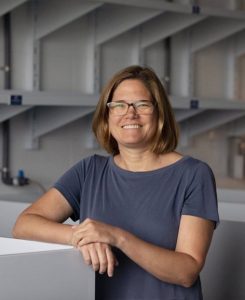November 2023: Janet Nye
Associate Professor at the University of North Carolina at Chapel Hill Institute for Marine Sciences
“To solve hard environmental problems, you have to include people from all walks of life in your research.”
Janet Nye

If you could sum up your research in 3 words, what would they be and why?
- Inclusion: From the start of my career, I’ve tried to answer questions that affect the oceans by considering not just one stressor, but many stressors and how they interact. Similarly, to solve hard environmental problems, you have to include people from all walks of life in your research.
- Resilience: It is difficult to predict how many social and environmental factors will affect our coastal ecosystems and communities so ultimately our research aims to make ecosystems and social structures more resilient to unanticipated events. Resilience is also the one skill that I think is most beneficial to my students and that I try to instill in them so that they can face any challenge.
- Climate: My research on how climate affects fisheries is a very tangible way that people can relate to environmental change and connect to how climate change affects them directly by impacting their job, way of life, what they see on their dinner plate, and what recreational activities they can do. It is a tremendous scientific challenge, but climate also relates to my other long-term goal to create a climate for students that is safe, encourages cooperation and acceptance, and is welcoming to all viewpoints. With tough environmental problems to solve, we need all hands-on deck and a culture that supports different viewpoints in constructive ways.
What is the most rewarding part of your job and what is the hardest part of your job?
The most rewarding part of my job is teaching students how to conduct good scientific research. Nothing is more gratifying than seeing a student gain the skills and confidence to infuse their own ideas and approach into a research topic.
The hardest part of my job is communicating the urgency of climate change while simultaneously giving people hope and solutions to a difficult problem.
How does your research and the research conducted in the fisheries indicator study benefit North Carolina citizens?
North Carolina and the US in general have done an excellent job managing fisheries with a single species approach. However, new (and old) challenges continue to arise, many of which involve conflicts between different stakeholders and competing priorities, all while climate change is making these decisions more contentious and difficult. My work to accumulate a vast array of indicators to evaluate the NC Fisheries Reform Act will help NC take an ecosystem-based approach to management, rather than just looking at one issue or species at a time.
Ecosystem-based approaches to fisheries management, and indicators in particular, allow managers and stakeholders to understand and objectively evaluate many different competing processes simultaneously. As a scientist, it is my job to objectively provide the data and analysis to allow people to make decisions, trade-offs, and compromises. By looking at trends in different parts of the ecosystem and NC fisheries, we can confront those challenges to make decisions that best benefit our fisheries, and thus, our state.
What is your hope for a positive outcome of this study?
My hope is that by evaluating indicators through time we can track our progress to sustainable fisheries management and understand how our coastal environment is changing.
